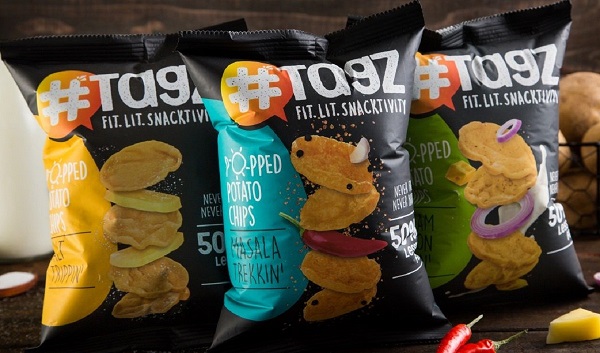The Indian packaged snacking market is worth over Rs 35,000 crores. This sector is dominated by old players and their old ways of creating snacks. Traditional players like Balaji, Haldiram and ITC offer multiple products but few hold nutritional goodness. It is overloaded with junk and unhealthy food to such an extent that it makes our snaking industry one of the unhealthiest in the world.
To change the way snacks are consumed with technology, Anish Basu Roy and Sagar Bhalotia opened TagZ Foods in 2019. Roy previously worked as a sales and marketing leader for Coca-Cola and Nokia. Whereas Bhalotia is an IIT Bombay graduate who has worked with a range of startups like Oyo, Quikr, HealthifyMe and more.
They claim to be India’s first brand to make popped potato chips (neither baked nor fried). By bringing in the best innovations in food tech they are creating a better snacking experience for the GenZ. They also offer international gourmet dips and a range of premium bar snacks. By leveraging food technology, the Bengaluru-based startup makes potato chips with no oil, no transfat, no preservatives and with zero cholesterol.
They have 30+ online partners including Amazon, Bigbasket and Swiggy Instamart along with an offline presence in 2000+ stores across the country. They have sold over 4 lakh units. In 2021, they had raised $500,000 as pre-Series A funds from Venture Catalysts, Dharamveer Chouhan of Zostel, Dhruv Toshniwal of The Pant Project, and Loy Halder of Goldman Sachs. They have even appeared on Shark Tank India. Here they have raised an undisclosed amount from Ashneer Grover of BharatPe and Namita Thapar of Emcure Pharmaceuticals.
Since the Shark Tank episode, they have registered a growth of 30-fold increase in terms of volume. Early this month, they have launched Community Stock Option Plan (CSOP) through which consumers can invest in the company. With the funds, they plan to expand its product line and strengthen its distribution across the country. In the future, they plan to become an international brand. Will such Make in India startups help make India’s $15 billion snacking industry healthier?

 Learn how Shark Tank India's TagZ Foods is bringing in the best innovations in food tech and are creating a better and healthier snacking experience for GenZ.
Learn how Shark Tank India's TagZ Foods is bringing in the best innovations in food tech and are creating a better and healthier snacking experience for GenZ.









.jpeg)




.jpeg)

.jpg)













